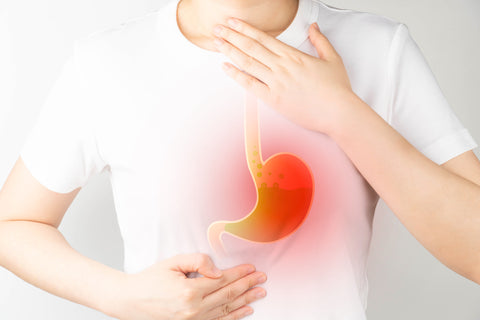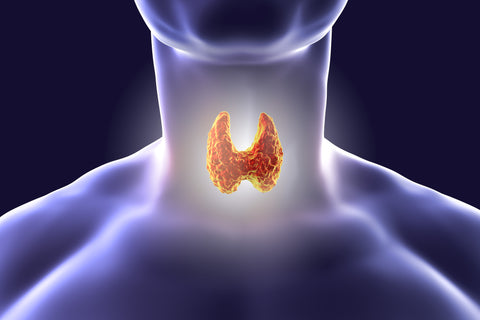
Although the terms heartburn, acid reflux, and GERD (gastroesophageal reflux disease) are often used interchangeably there are some differences between these conditions.
Acid reflux is a pain in the oesophagus area defined as heartburn and it is caused by the backward flow of stomach acid into the oesophagus. Heartburn occurs in the oesophagus and involves mild to severe pain in the chest which is often mistaken for heart pain due to the same location. The lining of your oesophagus is much more delicate than that of the stomach. Therefore, whenever some acid in the oesophagus causes a burning sensation in your chest. The pain can feel sharp, burning, or like a tightening sensation.
GERD (gastroesophageal reflux disease) is the chronic or frequent acid reflux (causing heartburn), more severe form of acid reflux.
Heartburn is just a symptom of acid reflux and GERD.
POSSIBLE CAUSES
- We have brainwashed us with the idea that acid reflux is caused by high stomach acid levels. The truth is that insufficient stomach acid leads to increase in intra-abdominal pressure (IAP) that imposes pressure on the lower oesophageal sphincter (LES). As a result the sphincter opens allowing small amount of stomach acid get inside oesophagus causing burning pain (heartburn, acid reflux) because unlike stomach oesophagus is not protected from acid. The same problem takes place when contents of our stomach start to ferment due to low acid levels which leads to inability to digest proteins. It creates gas, which has to be released and imposes pressure on the lower oesophageal sphincter (LES) opening it slightly and allowing that gas to travel up causing belching and. Apart from the gas, a little bit of stomach acid also gets into the oesophagus triggering heartburn. Yes antacids can help reduce the symptom by lowering stomach acid but at the same time they exacerbate the root cause of the problem which is deficiency of stomach acid which causes indigestion and bloating leading to heartburn.
- Also hiatal hernia is a frequent cause of acid reflux. Diaphragm helps separate the stomach from the chest and in hiatal hernia the upper part of the stomach protrudes above the diaphragm, allowing acid to escape.
- Magnesium deficiency can lead to improper functioning of the sphincter that prevents stomach acid from entering oesophagus.
- In pregnancy the foetus can put extra pressure on the oesophageal valve, causing the release of acid.
- Overweight imposes extra pressure on the valves and sphincter that allow release of acid.
- Acidic foods: meat products, dairy, coffee, cola, chocolate, sugar, refined products, etc.
- Large meals and snacking close to bedtime. Overloaded stomach increases pressure on the diaphragm, causing acid to travel upward.
- Smoking impairs muscle reflexes and increases production of acid.
- Medications, including ibuprofen, aspirin, etc. can cause acid reflux.
- Helicobacter pylori, which is a common today cause of stomach ulcers, contributes to heartburn.
- Excessive exercise after meals can cause acid reflux by putting extra pressure in the abdominal cavity.
BENEFICIAL SUPPLEMENTS
- Try supplements that contain HCL with Pepsin but take it only when you consume protein meals (meat, dairy, fish, pulses, etc). Some people need one capsule; others may need to take more.
- Betaine hydrochloride (Betaine HCl), usually derived from beets, is an amino acid and supplement for helping food to be fully processed in the stomach for optimum nutritional benefits. Betaine HCl promotes healthy stomach acidity, gastric function and the digestion of protein as it activates pepsin used to break down proteins into amino acids. Betaine hydrochloride helps absorb vitamins – increasing their bioavailability. Betaine may also help regulate homocysteine levels as it is used to convert homocysteine in the blood to methionine. Elevated homocysteine levels, which increase with age, are linked to heart issues and blood clots. In the body betaine can be created by choline in combination with the amino acid glycine. Just like some B vitamins, including folate and vitamin B12, betaine is considered to be a methyl donor that aids in detoxification and liver function.
- Take supplements with vitamin B6, Zinc and B12 as they are required for the production of stomach acid and normal nervous system function.
- Try to relax and learn to control stress as there is a direct correlation between stress and indigestion due to the fact that brain is very closely connected to the gastro-intestinal tract. In order to help nervous system calm down try to take 200-400mg of Magnesium citrate before breakfast and before bed, B complex (50-100mg) after breakfast, 50 mg of Zinc citrate after a meal, and take supplements with Chamomile which is known to promote relaxation
- Magnesium is a calming and relaxing mineral, and it helps relax the LES muscle so it closes properly. A 2014 study concluded that medications containing magnesium improved GERD. A separate study confirmed that magnesium helps heal oesophagus and reduce heartburn. Try taking Magnesium citrate to relax stomach muscle and intestines: 2 times a day 200-400mg 1 hour before meal and 1-2 hours before bed.
- Charcoal tablets or powder might be very helpful too (requires drinking more water in between meals).
- Chlorella (requires drinking more water in between meals). It is very effective in lowering acidity, detoxifying the body, boosting energy and regenerating damaged tissue.
- Good Probiotic formula to increase number of beneficial bacteria in your intestines.
- Formulas with variety of Digestive Enzymes will improve digestion.
- Ginger has been used for many people as very effective digestive aid and natural remedy for digestive problems, weak immunity or nausea. Researchers also discovered that three capsules of ginger with meals can actually help people with dyspepsia and abnormally delayed gastric emptying to release stomach contents into the small intestines much faster. Ginger also helps get read of other gastrointestinal problems. In addition it relaxes the smooth muscle in the gastro-intestinal tract thus preventing constipation.
LIFESTYLE AND DIET RECOMMENDATIONS
- Avoid or significantly reduce: overeating, caffeine (coffee, cola, black and green teas, etc.), and decaffeinated coffee, chocolate (extremely acidic), alcohol, meat, dairy, sugar, glucose, fructose syrup, refined foods, white flour products, white rice, hot spices, antibiotics, refined salt.
- Drink 3 times a day about 3 glasses of water 1 hour before meals or 2 hours after meals. Try to drink only distilled water. Never drink water or other liquids with meals (except ½ glass of juice).
- If the symptoms are stronger at night, elevate the head of your bed by six to eight inches (to prevent stomach acid from refluxing while you’re lying down).
- Use an acid reflux wedge pillow as it will relieve symptoms by elevating the upper body.
- Learn to control stress.
- Fast walking every day.
- Don’t eat within three hours of bedtime.
- Don’t lie down after meals. Light physical activity such as walking is most beneficial after meals.
- Avoid: Alcohol, carbonated beverages, sugary drinks or energy drinks, artificial sweeteners, spicy foods, and processed foods.
- Don’t overeat. Eat smaller meals to allow foods to properly digest, as large meals and overeating put extra pressure on the sphincter.
- Eat slowly and chew foods more thoroughly.
REFERENCES
- A dietary supplement containing melatonin, l-tryptophan, vitamin B6, folic acid, vitamin B12, methionine and betaine, is superior to omeprazole in treating GERD >
- Astaxanthin reduces reflux symptoms in patients, especially in those with pronounced H. pylori infection >
- Ginger has a gastroprotective effect through its acid blocking and anti-Helico bacter pylori activity >
- Curcumin inhibits esophageal activation in response to acid >
Any information or product suggested on this website is not intended to diagnose, treat, cure or prevent any medical condition. Never disregard medical advice or delay in seeking it because of something you have read on this website. Consult your primary healthcare physician before using any supplements or making any changes to your regime.





